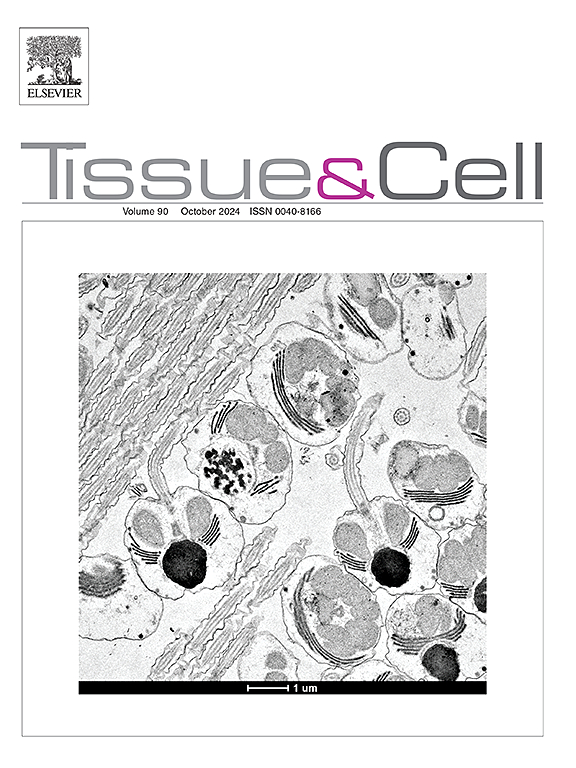Combating oxidative stress and inflammation in gentamicin-induced nephrotoxicity using hydrogen-rich water
IF 2.7
4区 生物学
Q1 ANATOMY & MORPHOLOGY
引用次数: 0
Abstract
Gentamicin-induced nephrotoxicity primarily results from renal inflammatory cascades and increased oxidative stress. This study aims to examine the effects of hydrogen-rich water (HRW) on gentamicin-induced renal damage in rats. Thirty-two rats were equally divided into four groups, including control (no treatment), hydrogen, gentamicin, and gentamicin+hydrogen. At the end of one week, all animals were euthanized following ethical rules, and blood and tissue samples were analyzed for examining Malondialdehyde (MDA), glutathione (GSH), Tumor Necrosis Factor-Alfa (TNF-α), Tumor Necrosis Factor-Beta (TNF-β), Interleukin 6 (IL-6), endoglin, endocan, urea, creatinine, Na+, and K+ parameters. Levels of 8-Hydroxyguanosine (8-OHdG), MDA, and Bax were immunohistochemically analyzed. Data showed that while MDA (control P<0.0001, H2 P<0.0001, Genta+H2 P<0.0007), TNF-α (control P<0.0002, H2 P<0.0040, Genta+H2 P<0.0381), IL-6 (control P<0.0044, H2 P<0.0070, Genta+H2 P<0.0109), endocan (control P<0.0460, H2 P<0.0286, Genta+H2 P<0.0452), and endoglin (control P<0.0131, H2 P<0.0164, Genta+H2 P<0.0397), urea (control P<0.0024, H2 P<0.0001, Genta+H2 P<0.0180), and creatinine parameters (control P<0.0017, H2 P<0.0178, Genta+H2 P<0.0011) increased in the gentamicin group compared to the other groups, a decrease in these parameters was observed in the gentamicin+hydrogen group compared to the gentamicin group. The Genta group had greater levels of TNF-β than the control (P<0.0042) and H2 groups (P<0.0268). GSH content was higher in the hydrogen group compared to the gentamicin group. Immunohistochemically, 8-OHdG, MDA, and Bax expressions increased in the gentamicin group compared to the control group, whereas they decreased in the gentamicin+hydrogen group compared to the gentamicin group. Hydrogen may be an alternative treatment for oxidative stress-induced nephrotoxicity.
利用富氢水对抗庆大霉素诱导的肾毒性中的氧化应激和炎症反应
庆大霉素诱发的肾毒性主要源于肾脏炎症级联反应和氧化应激的增加。本研究旨在探讨富氢水(HRW)对庆大霉素诱导的大鼠肾损伤的影响。32 只大鼠被平均分为四组,包括对照组(无处理)、氢气组、庆大霉素组和庆大霉素+氢气组。一周后,按照伦理规定对所有动物实施安乐死,并对血液和组织样本进行分析,以检测丙二醛(MDA)、谷胱甘肽(GSH)、肿瘤坏死因子-Alfa(TNF-α)、肿瘤坏死因子-Beta(TNF-β)、白细胞介素6(IL-6)、内皮素、内皮素、尿素、肌酐、Na+和K+参数。对 8-羟基鸟苷(8-OHdG)、MDA 和 Bax 的水平进行了免疫组化分析。
本文章由计算机程序翻译,如有差异,请以英文原文为准。
求助全文
约1分钟内获得全文
求助全文
来源期刊

Tissue & cell
医学-解剖学与形态学
CiteScore
3.90
自引率
0.00%
发文量
234
期刊介绍:
Tissue and Cell is devoted to original research on the organization of cells, subcellular and extracellular components at all levels, including the grouping and interrelations of cells in tissues and organs. The journal encourages submission of ultrastructural studies that provide novel insights into structure, function and physiology of cells and tissues, in health and disease. Bioengineering and stem cells studies focused on the description of morphological and/or histological data are also welcomed.
Studies investigating the effect of compounds and/or substances on structure of cells and tissues are generally outside the scope of this journal. For consideration, studies should contain a clear rationale on the use of (a) given substance(s), have a compelling morphological and structural focus and present novel incremental findings from previous literature.
 求助内容:
求助内容: 应助结果提醒方式:
应助结果提醒方式:


